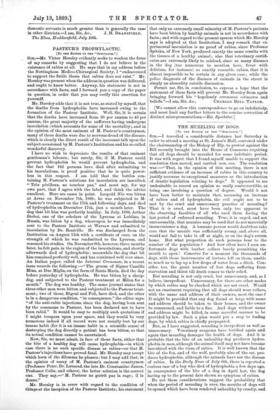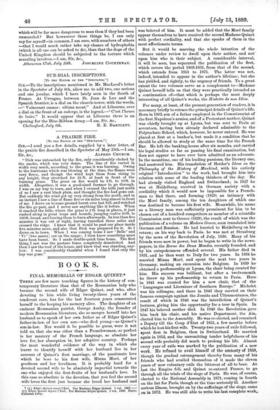THE MUZZLING OF DOGS.
[To THE EDITOR OF THE "SPECTATOR."]
SIB,—I travelled a considerable distance last Saturday in order to attend a meeting at St. James's Hall, convened under the chairmanship of the Bishop of Ely, to protest against the Bill recently brought into the House of Commons requiring that all dogs should be muzzled for some indefinite period. It was with regret that I found myself unable to support the resolution then moved, and carried nem. con. The resolution was :—." That, in the opinion of this meeting, there is not sufficient evidence of an increase of rabies in this country to justify recourse to exceptional measures or the introduction of drastic legislation relating to dogs." It appeared to me undesirable to record an opinion so easily controvertible, as being one involving a question of degree. Would it not have been better to maintain that, assuming an increase of rabies and of hydrophobia, the evil ought not to be met by the cruel and unnecessary practice of muzzling P That it is cruel, must have been only too apparent to the observing faculties of all who used them during the last period of enforced muzzling. True, it is urged, and not unreasonably, that muzzles may he used that do not materially inconvenience a dog. A humane person would doubtless take care that the muzzle was sufficiently roomy, and, above all, would not fail to take it off at night, or on the dog's return home. But what proportion do such persons bear to the number of the population P And how often have I seen un- fortunate dogs with leather collars barely permitting the month to open ! Conceive for a moment the thousands of dogs, with these instruments of torture left on them, unable so much as to lap up a few drops of water from a ditch. Con- sider, too, the great number of lost dogs suffering from starvation and thirst till death comes to their relief.
But muzzling is not only cruel, but unnecessary, and, as I believe, inexpedient. Unnecessary, for there are other modes by which rabies may be checked which are not cruel. Would not an enactment requiring that all dogs should wear collars, with the name and address of their owners, meet the case P It might be provided that any dog found at large with name and address should be taken to their homes, and the owner be summoned, and liable to a fine. And dogs without name and address might be killed, in some merciful manner to be provided by law. Such a plan would put a stop to loafing dogs, by which rabies is chiefly propagated.
But, as I have suggested, muzzling is inexpedient as well as unnecessary. Veterinary surgeons have testified again and again that muzzling damages the health of dogs. And it is probable that the bite of an unhealthy dog produces hydro.. phobia in men, although the animal itself may not have become inoculated with the virus of rabies. It is well known that the bite of the fox, and of the wolf, probably also of the cat, pro- duces hydrophobia, although the animals have not the disease
of rabies. In the Daily News of July 6th, there is reported a curious case of a boy who died of hydrophobia a few days ago, in. consequence of the bite of a dog in April last, the dog having up to the present date shown no symptom of rabies.
Do not these considerations suggest the probability that when the period of muzzling is over, the months of dogs will be opened which have been rendered unhealthy by cruelty, and
which will be far more dangerous to man than if they had been unmuzzled P But howsoever these things be, I can only say for myself—in common, I am sure, with numbers of others —that I would much rather take my chance of hydrophobia (which is all one can be asked to do), than that the dogs of the United Kingdom should be subjected to the torture which muzzling involves.—! am, Sir, clic.,



































 Previous page
Previous page